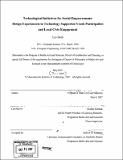| dc.contributor.advisor | Mitchel Resnick. | en_US |
| dc.contributor.author | Burd, Leo | en_US |
| dc.contributor.other | Massachusetts Institute of Technology. Dept. of Architecture. Program in Media Arts and Sciences. | en_US |
| dc.date.accessioned | 2008-09-03T14:47:35Z | |
| dc.date.available | 2008-09-03T14:47:35Z | |
| dc.date.copyright | 2007 | en_US |
| dc.date.issued | 2007 | en_US |
| dc.identifier.uri | http://hdl.handle.net/1721.1/42171 | |
| dc.description | Thesis (Ph. D.)--Massachusetts Institute of Technology, School of Architecture and Planning, Program in Media Arts and Sciences, 2007. | en_US |
| dc.description | Page 226 blank. | en_US |
| dc.description | Includes bibliographical references (p. 217-225). | en_US |
| dc.description.abstract | Never in history has the world seen so much discrepancy in wealth, power and living conditions. Believing that information and communication technologies can help address this issue, governments and funding organizations have been investing in bringing computers and internet connectivity to underserved communities. Unfortunately, many of those initiatives end up privileging the community residents who were the most visible, literate or active, leaving behind those who would need additional support and reinforcing even more the status quo. In order to foster a more democratic and participatory society, it is important to create initiatives that are more inclusive and empower individuals to control their own development. In this thesis, I propose a framework for the design and analysis of technological initiatives for social empowerment and I apply the framework in the implementation of two initiatives that focus primarily on youth participation and local civic engagement. In the Young Activists Network initiative, I worked with youth technology centers from different parts of the world organizing young people to become agents of change in the places where they live. In spite of the localized successes, the Young Activists Network approach required so much effort from our partner community organizations and volunteers that it would be virtually impossible to sustain it over time and scale it to other sites. Based on the lessons learned, I started the What's Up Lawrence project, an initiative that aimed at building a self-reinforcing, city-wide network to help young people in the organization of personally meaningful community events. | en_US |
| dc.description.abstract | (cont.) In order to support such a network, I built What's Up, a neighborhood news system that combines the power of the telephone and of the web to make it easier for young people to share information, promote community events, and find out what is happening in their region. This thesis provides a detailed description of these initiatives. It also highlights the main technical, educational and organizational elements that have to be considered in the implementation of technological initiatives for social empowerment and suggests the creation of a special organization to help in the adoption and refinement of such initiatives. | en_US |
| dc.description.statementofresponsibility | by Leo Burd. | en_US |
| dc.format.extent | 226 p. | en_US |
| dc.language.iso | eng | en_US |
| dc.publisher | Massachusetts Institute of Technology | en_US |
| dc.rights | M.I.T. theses are protected by
copyright. They may be viewed from this source for any purpose, but
reproduction or distribution in any format is prohibited without written
permission. See provided URL for inquiries about permission. | en_US |
| dc.rights.uri | http://dspace.mit.edu/handle/1721.1/7582 | en_US |
| dc.subject | Architecture. Program in Media Arts and Sciences. | en_US |
| dc.title | Technological initiatives for social empowerment : design experiments in technology-supported youth participation and local civic engagements | en_US |
| dc.type | Thesis | en_US |
| dc.description.degree | Ph.D. | en_US |
| dc.contributor.department | Program in Media Arts and Sciences (Massachusetts Institute of Technology) | |
| dc.identifier.oclc | 228858112 | en_US |
